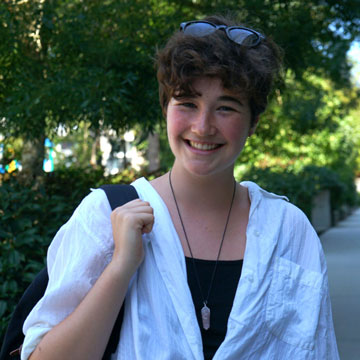When Darcy Bandeen arrived at UBC last year, the arts undergraduate student was filled with the usual first-year anxieties: “Will I meet anyone? Will I spend the next year alone in my dorm room crying myself to sleep, or am I going to have a phenomenal year? You don’t know how it’s going to go.”
Despite their anxieties, 19-year-old Bandeen—who identifies as non-binary and uses the pronouns they, their and them—quickly found a community, thanks in part to a Jump Start event for LGBT2SQIA+ students organized by UBC Equity & Inclusion (EIO).
“I went with a friend who was starting first year at the same time,” said Bandeen. “It was a great opportunity to ground myself in a social circle and find some familiar faces when I went to my first Pride Collective meetings.”

Darcy Bandeen
This year marks the third time that EIO is organizing Get Connected events specifically for students from marginalized communities, and the second year events will take place as part of Jump Start, a week of orientation events for all first-year students that takes place Aug. 24-30. In addition to offerings for LGBT2SQIA+ students, EIO is also organizing a BIPOC (Black, Indigenous, and people of colour) social, while the First Nations House of Learning is hosting a Jump Start lunch for Indigenous students.
“When we looked at results from the Undergraduate Experience Survey, we could see that queer and trans students, as well as students who are black, Indigenous or people of colour, were feeling a lack of community and connection at UBC. Our first Get Connected events were organized as a direct response,” said Sara-Jane Finlay, associate vice-president of equity and inclusion. “We went from two small groups of about 10 or 15 students in our first year to groups of about 65 students last year, and we’re excited to see how many students we’ll connect with this year.”
Tasha Nijjar, EIO equity educator, said the get-togethers help first-year students feel welcomed and supported from day one.
“These events are about creating intentional space for students who self-identify as belonging to those groups to come down and gather with other students who have had similar experiences,” said Nijjar. “We have returning students there to share their experience of being at UBC—places that they found useful, supports and ways that they’ve been able to connect. It’s also about recognizing the opportunities and challenges they might face.”
The events are also an opportunity to ask questions and learn about resources, added Nijjar. “If you are at orientation and no one mentions where the gender-neutral bathrooms are, and you don’t get that information, the message that gets conveyed is that maybe there isn’t a space for you here, or that you’re going to need to make a special accommodation to get that information,” she said.
Ultimately, these events reflect UBC’s deep commitment to embracing diversity and supporting student wellness, said Nijjar.
“When you’re in a minority, it can be intimidating to fully express yourself,” she said. “There’s something to be said for feeling seen and that it’s okay to be who you are.”
For Bandeen, who helped lead their high school’s gay-straight alliance, these events can be valuable for students who are struggling with their identity and with acceptance at home.
“Everyone comes to university from a different place,” they said. “I was very lucky to be in a supportive family and school environment, but some people don’t have that luxury or privilege. There were definitely people who weren’t necessarily as comfortable in their own skin, or who were more introverted or shy.
“Thanks to get-togethers like these, everyone has an opportunity to interact with people who may be facing similar struggles. There is a space for everyone at UBC.”